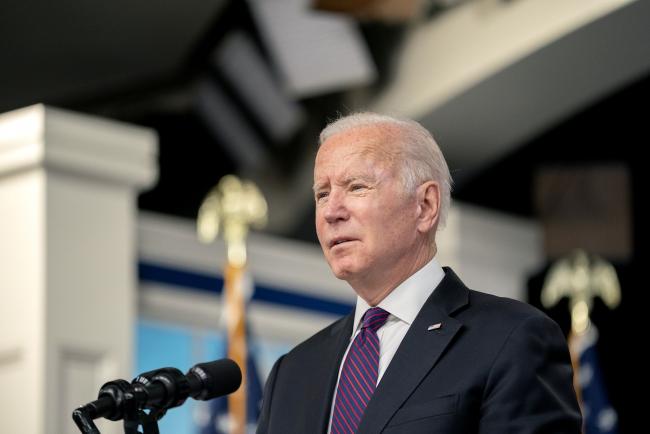(Bloomberg) -- The nonpartisan Congressional Budget Office estimated that President Joe Biden’s signature economic package doesn’t contain enough tax increases to pay for itself -- a determination that counters White House claims but may not be enough to sink the bill.
The CBO found that the draft legislation, on which the House plans to vote late Thursday, contains $1.636 trillion of spending, while raising $1.269 trillion in revenue over 10 years. That would add $367 billion to the U.S. budget deficits over the decade.
The Biden administration and Democratic leaders have long been prepared for the CBO to find a deficit increase, and the estimate may yet be acceptable to moderates in the House caucus who have insisted on seeing the tally before that chamber votes on the bill.
The score will, however, give ammunition to Republicans -- who are already attacking the bill by arguing it will increase inflation, stifle job creation and foster dependency on the government, in addition to saying it will add to the national debt.
A key reason the CBO finds the bill does not pay for itself involves estimates of how much increased tax collection can result from expanding the IRS’s budget. While the White House has projected that increasing the number of enforcement agents at the Internal Revenue Service would yield $400 billion in higher revenue, the CBO does not agree.
IRS Enforcement
The CBO, which has rules about counting effects from increased appropriations, does not formally credit the IRS provision with raising any revenue in its tables and in a footnote projects that giving the IRS $80 billion in further funding would net just $127.2 billion in possible revenue. Even that inflow wasn’t included in the overall revenue-raising tally, because of particular budget-estimating rules, the CBO said.
Despite CBO’s estimate, the White House continued to assert that the bill’s revenue is enough to pay for new spending.
“The combination of CBO’s scores over the last week, the Joint Committee on Taxation estimates, and Treasury analysis, make it clear that Build Back Better is fully paid for, and in fact will reduce our nation’s debt over time by generating more than $2 trillion through reforms that ask the wealthiest Americans and large corporations to pay their fair share,” Treasury Secretary Janet Yellen said in a statement.
The CBO’s spending estimate cannot be directly compared with the $1.75 trillion top-line number that the Biden administration has used when presenting its framework, or a revised White House estimate that the House bill, when paid family leave and other benefits are added, amounts to a $2 trillion “investment.” The CBO doesn’t consider money spent on tax credits in their top-line spending figure, but rather counts them as lost revenue.
House Democrats had delayed a vote on Biden’s tax and spending measure for weeks as they awaited the CBO estimate. Five moderate members in a statement two weeks ago pledged to vote for the bill if the estimates were consistent with the White House’s claims.
It remains to be seen if the CBO estimate is close enough to allow those moderates to vote for the bill or if changes will be necessary. Speaker Nancy Pelosi can afford to lose just three Democrats and still pass the bill, in face of united Republican opposition.
‘Ballpark’ Range
One of the moderates, Representative Kurt Schrader of Oregon, said Wednesday that the estimates have to be “in the ballpark.”
“If they’re not then we got problems,” he said.
Even if the bill passes the House, there is no guarantee it can clear the Senate -- where Democrats have yet to line up the 50 votes they need to pass it using a filibuster-proof budget process known as reconciliation. The GOP hopes that the CBO score, combined with rising inflation, will help them persuade moderate Senate Democrats to kill the bill.
“We are against trillions more spending borrowed from our kids, borrowed from China, that will fuel the inflation that’s already too high,” the No. 2 House Republican, Steve Scalise, said Wednesday. “We need to stop this madness, this runaway spending here in Washington.”
White House economic adviser Brian Deese argues that the bill reduces inflation, by lowering healthcare, childcare and drug costs and encouraging more workers to enter the workforce.
The Build Back Better proposal, as Biden’s plan is known, would provide universal pre-K, childcare subsidies, four weeks of subsidized paid family leave, subsidized Obamacare premiums and an alternative to Medicaid in some states, and would allow Medicare to negotiate prescription drug prices for the first time while capping out-of-pocket costs for seniors.
The CBO estimated that allowing Medicare to negotiate some drug prices will save $79 billion over a decade, but result in one fewer drug being brought to market over that time and four fewer in the following decade.
The program aims to fight climate change by imposing a fee on methane and providing a slew of tax credits for renewable energy and electric vehicle purchases, and it would provide relief from deportation for millions of undocumented immigrants.
On the tax side, the bill would extend expanded child tax credits and make them permanently refundable to those without sufficient income-tax liability to get the full benefit. It would also increase the cap on federal deductions for state and local taxes. To raise revenue, it would impose a new 15% corporate minimum tax and a 5% surtax on individual incomes over $10 million, with an additional 3% tax above income of $25 million. There are also taxes on large individual retirement accounts, stock buybacks and nicotine.
©2021 Bloomberg L.P.
